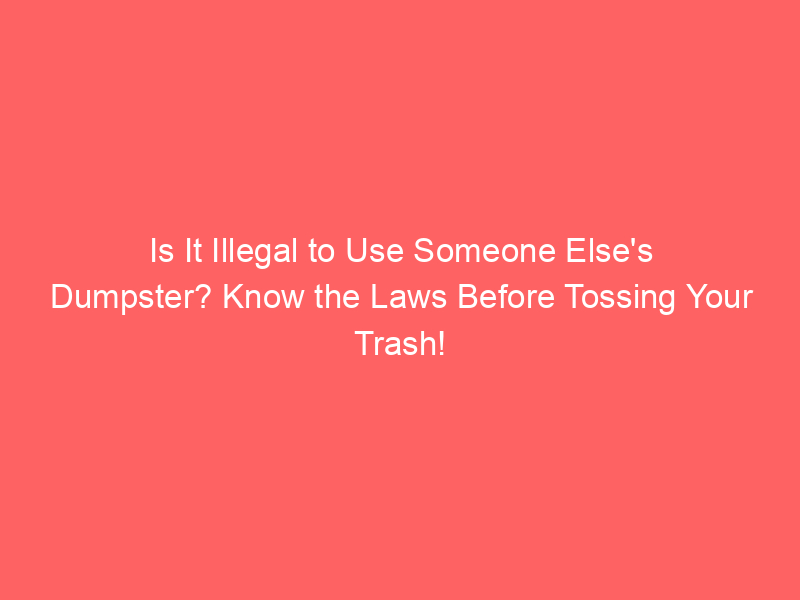When it comes to getting rid of excess waste, finding a convenient place to dispose of it can be a challenge. It’s tempting to toss your trash into the nearest dumpster, but before you do, pause and consider: Is it illegal to use someone else’s dumpster? This seemingly simple act can lead to unexpected legal complications. In this blog post, we’ll delve into the dos and don’ts of dumpster usage and the laws that govern them.
Understanding Dumpster Laws
Firstly, let’s clarify that dumpsters are typically private property. Whether they’re positioned outside a business or in an alley behind an apartment complex, they’re usually rented or owned by someone who pays for waste removal services. This is an essential point because using another person’s dumpster without permission could be considered theft of services or trespassing.
When Using Someone Else’s Dumpster Might Be Illegal:
- Trespassing: If you enter private property without authorization to use a dumpster, you’re trespassing.
- Theft of Services: Dumpsters often come with a cost for the owner — whether it’s a rental fee or paid service for waste collection. By adding your garbage, you are effectively stealing this service.
- Littering or Illegal Dumping: In many jurisdictions, placing your trash in someone else’s dumpster is considered illegal dumping.
Potential Consequences:
- Fines: Many cities have ordinances against unauthorized use of dumpsters which can result in hefty fines.
- Criminal Charges: Depending on local laws and the severity of the offense (such as dumping hazardous materials), criminal charges could be filed.
- Civil Damages: The owner of the dumpster could potentially sue for costs associated with additional disposal fees or clean-up if necessary.
Know Before You Toss
Before considering using someone else’s dumpster, take these steps:
- Ask Permission: The simplest way to avoid any legal trouble is to ask the owner if you may use their dumpster.
- Research Local Ordinances: Understand the regulations in your area concerning waste disposal and management.
- Consider Alternative Options: Look into public waste disposal sites, hiring junk removal services, or scheduling bulky item pick-up through your local waste service provider.
Real-life Scenarios
You might wonder how often people run into legal trouble over such matters. While not making daily headlines, there are cases where individuals face fines after being caught on security cameras illegally dumping trash in private dumpsters.
In one instance in Florida, two men faced felony charges after repeatedly dumping construction debris in another business’s dumpster without consent (source: Miami Herald). Another case involved a man in Ohio fined for repeatedly using a grocery store’s receptacle for his household trash (source: Columbus Dispatch).
These examples illustrate that while enforcement might vary widely between regions and circumstances, there is potential for significant consequences.
Tips For Legally Disposing Your Waste:
- Use Public Dumpsters: These are meant for general use but make sure they aren’t overflowing and that your refuse isn’t restricted by local guidelines.
- Rent A Dumpster: If you have a large amount of waste regularly consider renting your own roll-off container.
- Recycling Centers: Separate recyclable materials from your trash and take them to local recycling centers.
- Hazardous Waste Facilities: Properly dispose of paints, oils, batteries at designated facilities.
Final Thoughts
The answer isn’t straightforward – while it may not always lead to jail time, using someone else’s dumpster can indeed be illegal depending on where you live and what laws apply there. It is always best practice to respect other people’s property and seek permissible ways to manage your waste responsibly.
Remember that understanding local statutes regarding trash disposal can save you from unnecessary fines or legal issues down the road. When in doubt—don’t throw it out! Seek alternatives instead and keep our communities clean legally and ethically.


